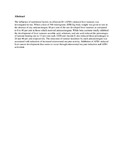| dc.contributor.author | Wakhisi, J | |
| dc.contributor.author | Kilonzo, MM | |
| dc.contributor.author | Nyandieka,HS | |
| dc.date.accessioned | 2013-06-10T12:21:17Z | |
| dc.date.available | 2013-06-10T12:21:17Z | |
| dc.date.issued | 1990 | |
| dc.identifier.citation | Indian J Med Res. 1990 Oct;92:332-6. | en |
| dc.identifier.uri | http://hinari-gw.who.int/whalecomwww.ncbi.nlm.nih.gov/whalecom0/pubmed/2125579 | |
| dc.identifier.uri | http://erepository.uonbi.ac.ke:8080/xmlui/handle/123456789/30796 | |
| dc.description.abstract | The influence of nutritional factors on aflatoxin B1 (AFB1)-induced liver tumours was investigated in rats. When a dose of 500 micrograms AFB1/kg body weight was given to rats in the absence of any anticarcinogen, 80 per cent of the rats developed liver tumours as compared to 0 to 40 per cent in those which received anticarcinogens. While beta-carotene totally inhibited the development of liver tumours ascorbic acid, selenium, and uric acid reduced the percentages of tumour-bearing rats to 13 per cent each. GSH and vitamin E also reduced these percentages to 20 and 40 per cent respectively. The reduction of tumour incidence by each anticarcinogen was associated with induction of increased microsomal enzyme activity. Inhibition of AFB1-induced liver cancer development thus seems to occur through microsomal enzyme induction and AFB1 activation. | en |
| dc.language.iso | en | en |
| dc.title | Association of reduction of AFB1-induced liver tumours by antioxidants with increased activity of microsomal enzymes | en |
| dc.type | Article | en |
| local.publisher | Department of Biochemistry, Faculty of Medicine, University of Nairobi, Kenya | en |

